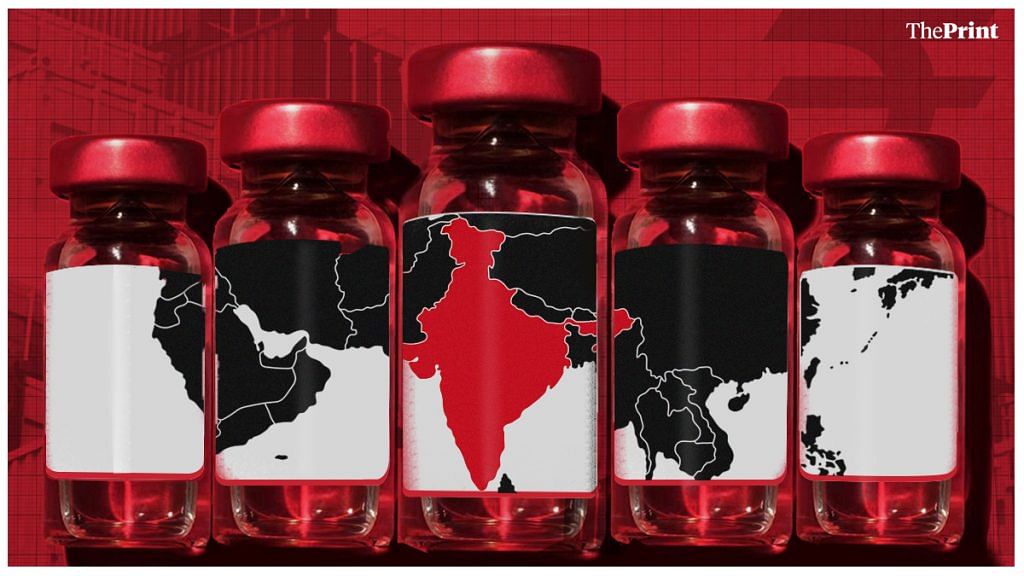This week, the government of India fast-tracked the use of foreign-made vaccines that have been cleared by regulators in the US, UK, European Union and Japan, or are on the WHO’s emergency use list. And while the sharp surge in Covid-19 cases and the ensuing lockdowns and disruptions has again put the economy at risk, this will pave the way for a faster economic recovery.
There was no restriction on the part of the producing country of these vaccines — it was India’s self-imposed restriction. It is welcome news that this restriction has been removed.
So far, with its large population and limited state capacity, India has been able to vaccinate barely 7 per cent of its population. At the current pace, it would take more than two years to cover the entire population, something India can ill-afford.
Also read: This CSIR sero survey could partly explain why India is in the grip of Covid wave again
3 reasons why it’s an important move
There are three important reasons why India has allowed the import of these vaccines.
First, under the new rules, the use of the vaccine in India will not require prior local trials, and thus, they can be rolled out very fast. Local trials can take a long time and while there may be benefits due to differences in population characteristics, these benefits may be far outweighed by the costs to lives and health that are being faced with the greater spread of Covid-19.
Second, this move can help fight vaccine-resistant mutations of the virus. If the bulk of the population has primarily received only one kind of vaccine, the virus is more likely to be able to spread again people, once it develops a mutation to beat that particular vaccine.
This scenario is unlikely in the case of the population having taken different vaccines, as they will have varying susceptibility to different stains. This will help the population develop herd immunity faster than one with a single vaccine. Many countries are allowing different kinds of vaccines to reduce this risk of spread of vaccine-resistant strains.
Third, vaccines which are administered in a single shot may be more cost-effective in remote parts of the country. The cost of the administration of a vaccine for the government is not merely the cost of the vaccine, but also the supply chain and logistics, staff and facilities for administering the shot. This is double the cost when two jabs are required.
These considerations can feed into choice of vaccine to be employed in different parts of the country.
Also read: Covid surge hits air travel, so carriers turn to govt for financial help, lower capacity limit
Next steps
Now that vaccines from abroad are being permitted, the next question is who will be allowed to import those vaccines? So far, restrictions were imposed on the purchase of vaccines by companies or individuals, in the belief that supply was limited and thus higher demand would deprive the most needy — the elderly or those with comorbidities — from getting the vaccine.
Once the vaccination drive was opened up to those above 45 years of age, sudden shortages emerged. At the same time, Covid cases surged even beyond what was seen in the first wave, and it became necessary to supplement supply through imports.
The next steps in the roll out of the vaccine should keep in mind the limited capacity of the government and the health system to reach out to all parts of the population at the speed required. In addition to the hospitals engaged in the vaccine outreach programme, the government needs to utilise the vast resources of institutions, of private companies and businesses who wish to restart their operations and want to vaccinate their staff.
Many businesses may be willing to import the vaccine even at a higher cost. Since that will supplement domestic supply, there is no reason why they should not be allowed to do so.
As a large importer, when the government of India places orders for vaccines with producers, it might be able to negotiate favourable prices from suppliers. After all, producers also realise that the current very high demand for the vaccine will collapse as herd immunity develops when people either get vaccinated or have contracted the virus. It is possible that pharma companies who have invested millions in developing the vaccine have only a short time when vaccine procurement is high on the agenda.
While it is also possible that like flu shots, human beings might need annual vaccines for emerging new strains of Covid, that is not something we know yet. Vaccine producers who are profit-making private companies and are faced with a short window to sell their products, will likely readily negotiate prices for large orders. This bodes well for India.
Ila Patnaik is an economist and a professor at National Institute of Public Finance and Policy. Views are personal.
Also read: As Modi’s ‘Tika Utsav’ ends, many states & pvt hospitals wait for Centre to fill vaccine gap
